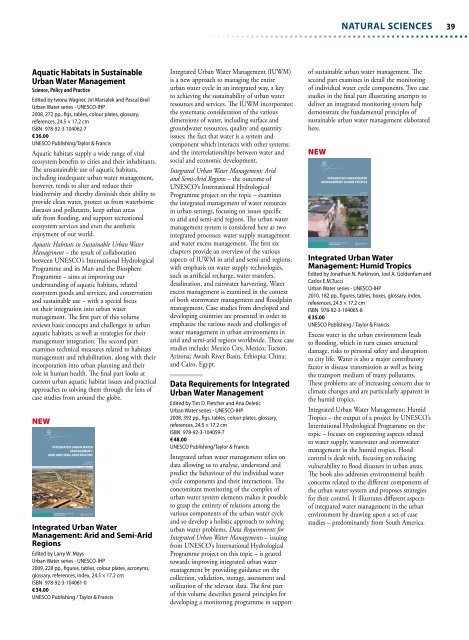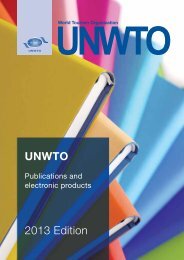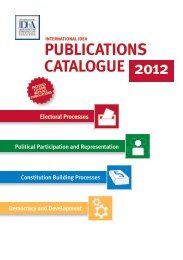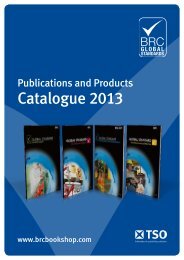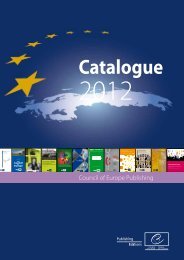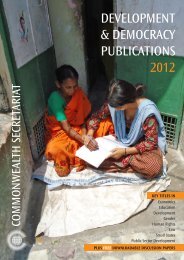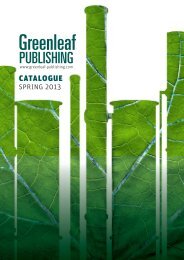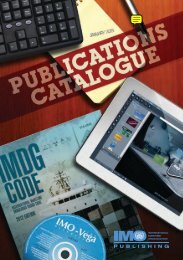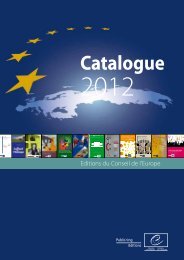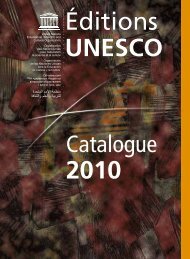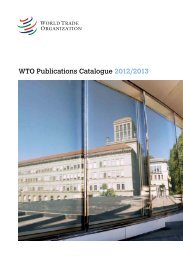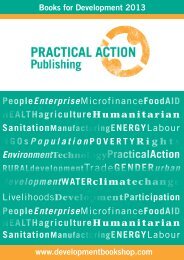UNESCO 2010/11 - Renouf Publishing Co. Ltd.
UNESCO 2010/11 - Renouf Publishing Co. Ltd.
UNESCO 2010/11 - Renouf Publishing Co. Ltd.
Create successful ePaper yourself
Turn your PDF publications into a flip-book with our unique Google optimized e-Paper software.
Urban Water Series - <strong>UNESCO</strong>-IHP<br />
<strong>UNESCO</strong> <strong>Publishing</strong><br />
Urban Water Series - <strong>UNESCO</strong>-IHP<br />
<strong>UNESCO</strong> <strong>Publishing</strong><br />
NATURAL SCIENCES<br />
39<br />
Aquatic Habitats in Sustainable<br />
Urban Water Management<br />
Science, Policy and Practice<br />
Edited by Iwona Wagner, Jiri Marsalek and Pascal Breil<br />
Urban Water series - <strong>UNESCO</strong>-IHP<br />
2008, 272 pp., figs, tables, colour plates, glossary,<br />
references, 24.5 × 17.2 cm<br />
ISBN 978-92-3-104062-7<br />
€ 36.00<br />
<strong>UNESCO</strong> <strong>Publishing</strong>/Taylor & Francis<br />
Aquatic habitats supply a wide range of vital<br />
ecosystem benefits to cities and their inhabitants.<br />
The unsustainable use of aquatic habitats,<br />
including inadequate urban water management,<br />
however, tends to alter and reduce their<br />
biodiversity and thereby diminish their ability to<br />
provide clean water, protect us from waterborne<br />
diseases and pollutants, keep urban areas<br />
safe from flooding, and support recreational<br />
ecosystem services and even the aesthetic<br />
enjoyment of our world.<br />
Aquatic Habitats in Sustainable Urban Water<br />
Management – the result of collaboration<br />
between <strong>UNESCO</strong>’s International Hydrological<br />
Programme and its Man and the Biosphere<br />
Programme – aims at improving our<br />
understanding of aquatic habitats, related<br />
ecosystem goods and services, and conservation<br />
and sustainable use – with a special focus<br />
on their integration into urban water<br />
management. The first part of this volume<br />
reviews basic concepts and challenges in urban<br />
aquatic habitats, as well as strategies for their<br />
management integration. The second part<br />
examines technical measures related to habitats<br />
management and rehabilitation, along with their<br />
incorporation into urban planning and their<br />
role in human health. The final part looks at<br />
current urban aquatic habitat issues and practical<br />
approaches to solving them through the lens of<br />
case studies from around the globe.<br />
NEW<br />
INTEGRATED URBAN WATER<br />
MANAGEMENT:<br />
ARID AND SEMI-ARID REGIONS<br />
EDITED BY<br />
LARRY W. MAYS<br />
Integrated Urban Water<br />
Management: Arid and Semi-Arid<br />
Regions<br />
Edited by Larry W. Mays<br />
Urban Water series - <strong>UNESCO</strong>-IHP<br />
2009, 228 pp., figures, tables, colour plates, acronyms,<br />
glossary, references, index, 24.5 × 17.2 cm<br />
ISBN 978-92-3-104061-0<br />
€ 34.00<br />
<strong>UNESCO</strong> <strong>Publishing</strong> / Taylor & Francis<br />
Integrated Urban Water Management (IUWM)<br />
is a new approach to managing the entire<br />
urban water cycle in an integrated way, a key<br />
to achieving the sustainability of urban water<br />
resources and services. The IUWM incorporates:<br />
the systematic consideration of the various<br />
dimensions of water, including surface and<br />
groundwater resources, quality and quantity<br />
issues; the fact that water is a system and<br />
component which interacts with other systems;<br />
and the interrelationships between water and<br />
social and economic development.<br />
Integrated Urban Water Management: Arid<br />
and Semi-Arid Regions – the outcome of<br />
<strong>UNESCO</strong>’s International Hydrological<br />
Programme project on the topic – examines<br />
the integrated management of water resources<br />
in urban settings, focusing on issues specific<br />
to arid and semi-arid regions. The urban water<br />
management system is considered here as two<br />
integrated processes: water supply management<br />
and water excess management. The first six<br />
chapters provide an overview of the various<br />
aspects of IUWM in arid and semi-arid regions,<br />
with emphasis on water supply technologies,<br />
such as artificial recharge, water transfers,<br />
desalination, and rainwater harvesting. Water<br />
excess management is examined in the context<br />
of both stormwater management and floodplain<br />
management. Case studies from developed and<br />
developing countries are presented in order to<br />
emphasize the various needs and challenges of<br />
water management in urban environments in<br />
arid and semi-arid regions worldwide. These case<br />
studies include: Mexico City, Mexico; Tucson,<br />
Arizona; Awash River Basin, Ethiopia; China;<br />
and Cairo, Egypt.<br />
Data Requirements for Integrated<br />
Urban Water Management<br />
Edited by Tim D. Fletcher and Ana Deletic<br />
Urban Water series - <strong>UNESCO</strong>-IHP<br />
2008, 392 pp., figs, tables, colour plates, glossary,<br />
references, 24.5 × 17.2 cm<br />
ISBN 978-92-3-104059-7<br />
€ 48.00<br />
<strong>UNESCO</strong> <strong>Publishing</strong>/Taylor & Francis<br />
Integrated urban water management relies on<br />
data allowing us to analyse, understand and<br />
predict the behaviour of the individual water<br />
cycle components and their interactions. The<br />
concomitant monitoring of the complex of<br />
urban water system elements makes it possible<br />
to grasp the entirety of relations among the<br />
various components of the urban water cycle<br />
and so develop a holistic approach to solving<br />
urban water problems. Data Requirements for<br />
Integrated Urban Water Managements – issuing<br />
from <strong>UNESCO</strong>’s International Hydrological<br />
Programme project on this topic – is geared<br />
towards improving integrated urban water<br />
management by providing guidance on the<br />
collection, validation, storage, assessment and<br />
utilization of the relevant data. The first part<br />
of this volume describes general principles for<br />
developing a monitoring programme in support<br />
of sustainable urban water management. The<br />
second part examines in detail the monitoring<br />
of individual water cycle components. Two case<br />
studies in the final part illustrating attempts to<br />
deliver an integrated monitoring system help<br />
demonstrate the fundamental principles of<br />
sustainable urban water management elaborated<br />
here.<br />
NEW<br />
INTEGRATED URBAN WATER<br />
MANAGEMENT: HUMID TROPICS<br />
EDITED BY<br />
JONATHAN N. PARKINSON, JOEL A. GOLDENFUM AND CARLOS E.M. TUCCI<br />
Integrated Urban Water<br />
Management: Humid Tropics<br />
Edited by Jonathan N. Parkinson, Joel A. Goldenfum and<br />
Carlos E.M.Tucci<br />
Urban Water series - <strong>UNESCO</strong>-IHP<br />
<strong>2010</strong>, 182 pp., figures, tables, boxes, glossary, index,<br />
references, 24.5 × 17.2 cm<br />
ISBN 978-92-3-104065-8<br />
€ 35.00<br />
<strong>UNESCO</strong> <strong>Publishing</strong> / Taylor & Francis<br />
Excess water in the urban environment leads<br />
to flooding, which in turn causes structural<br />
damage, risks to personal safety and disruption<br />
to city life. Water is also a major contributory<br />
factor in disease transmission as well as being<br />
the transport medium of many pollutants.<br />
These problems are of increasing concern due to<br />
climate changes and are particularly apparent in<br />
the humid tropics.<br />
Integrated Urban Water Management: Humid<br />
Tropics – the output of a project by <strong>UNESCO</strong>’s<br />
International Hydrological Programme on the<br />
topic – focuses on engineering aspects related<br />
to water supply, wastewater and stormwater<br />
management in the humid tropics. Flood<br />
control is dealt with, focusing on reducing<br />
vulnerability to flood disasters in urban areas.<br />
The book also addresses environmental health<br />
concerns related to the different components of<br />
the urban water system and proposes strategies<br />
for their control. It illustrates different aspects<br />
of integrated water management in the urban<br />
environment by drawing upon a set of case<br />
studies – predominantly from South America.


